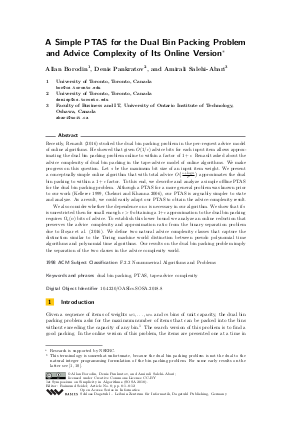A Simple PTAS for the Dual Bin Packing Problem and Advice Complexity of Its Online Version
Authors Allan Borodin, Denis Pankratov, Amirali Salehi-Abari
-
Part of:
Volume:
1st Symposium on Simplicity in Algorithms (SOSA 2018)
Part of: Series: Open Access Series in Informatics (OASIcs) - License:
 Creative Commons Attribution 3.0 Unported license
Creative Commons Attribution 3.0 Unported license
- Publication Date: 2018-01-05
File

PDF
OASIcs.SOSA.2018.8.pdf
- Filesize: 498 kB
- 12 pages
Document Identifiers
Subject Classification
Keywords
- dual bin packing
- PTAS
- tape-advice complexity
Metrics
- Access Statistics
-
Total Accesses (updated on a weekly basis)
0PDF Downloads0Metadata Views
Abstract
Recently, Renault (2016) studied the dual bin packing problem in the per-request advice model of online algorithms. He showed that given O(1/eps) advice bits for each input item allows approximating the dual bin packing problem online to within a factor of 1+\eps. Renault asked about the advice complexity of dual bin packing in the tape-advice model of online algorithms. We make progress on this question. Let s be the maximum bit size of an input item weight. We present a conceptually simple online algorithm that with total advice O((s + log n)/eps^2) approximates the dual bin packing to within a 1+eps factor. To this end, we describe and analyze a simple offline PTAS for the dual bin packing problem. Although a PTAS for a more general problem was known prior to our work (Kellerer 1999, Chekuri and Khanna 2006), our PTAS is arguably simpler to state and analyze. As a result, we could easily adapt our PTAS to obtain the advice-complexity result. We also consider whether the dependence on s is necessary in our algorithm. We show that if s is unrestricted then for small enough eps > 0 obtaining a 1+eps approximation to the dual bin packing requires Omega_eps(n) bits of advice. To establish this lower bound we analyze an online reduction that preserves the advice complexity and approximation ratio from the binary separation problem due to Boyar et al. (2016). We define two natural advice complexity classes that capture the distinction similar to the Turing machine world distinction between pseudo polynomial time algorithms and polynomial time algorithms. Our results on the dual bin packing problem imply the separation of the two classes in the advice complexity world.
Cite As Get BibTex
Allan Borodin, Denis Pankratov, and Amirali Salehi-Abari. A Simple PTAS for the Dual Bin Packing Problem and Advice Complexity of Its Online Version. In 1st Symposium on Simplicity in Algorithms (SOSA 2018). Open Access Series in Informatics (OASIcs), Volume 61, pp. 8:1-8:12, Schloss Dagstuhl – Leibniz-Zentrum für Informatik (2018)
https://doi.org/10.4230/OASIcs.SOSA.2018.8
BibTex
@InProceedings{borodin_et_al:OASIcs.SOSA.2018.8,
author = {Borodin, Allan and Pankratov, Denis and Salehi-Abari, Amirali},
title = {{A Simple PTAS for the Dual Bin Packing Problem and Advice Complexity of Its Online Version}},
booktitle = {1st Symposium on Simplicity in Algorithms (SOSA 2018)},
pages = {8:1--8:12},
series = {Open Access Series in Informatics (OASIcs)},
ISBN = {978-3-95977-064-4},
ISSN = {2190-6807},
year = {2018},
volume = {61},
editor = {Seidel, Raimund},
publisher = {Schloss Dagstuhl -- Leibniz-Zentrum f{\"u}r Informatik},
address = {Dagstuhl, Germany},
URL = {https://drops.dagstuhl.de/entities/document/10.4230/OASIcs.SOSA.2018.8},
URN = {urn:nbn:de:0030-drops-83033},
doi = {10.4230/OASIcs.SOSA.2018.8},
annote = {Keywords: dual bin packing, PTAS, tape-advice complexity}
}
Author Details
References
- Susan F. Assmann, David S. Johnson, Daniel J. Kleitman, and Joseph Y.-T. Leung. On a dual version of the one-dimensional bin packing problem. J. Algorithms, 5(4):502-525, 1984. URL: http://dx.doi.org/10.1016/0196-6774(84)90004-X.
-
Laszlo Babai, Peter Frankl, and Janos Simon. Complexity classes in communication complexity theory. In Proc. of the 27th Symp. on Found. of Comput. Sci., SFCS '86, pages 337-347, 1986.

-
Hans-Joachim Böckenhauer, Dennis Komm, Rastislav Královič, Richard Královič, and Tobias Mömke. On the advice complexity of online problems. Algorithms and Computation, pages 331-340, 2009.

-
Allan Borodin, Denis Pankratov, and Amirali Salehi-Abari. On conceptually simple algorithms for variants of online bipartite matching. In WAOA'17: The 15th workshop on approximation and online algorithms (To appear), 2017.

-
Joan Boyar, Lene M Favrholdt, Christian Kudahl, Kim S Larsen, and Jesper W Mikkelsen. Online algorithms with advice: a survey. ACM SIGACT News, 47(3):93-129, 2016.

-
Joan Boyar, Lene M. Favrholdt, Christian Kudahl, and Jesper W. Mikkelsen. The advice complexity of a class of hard online problems. Theory of Comput. Sys., 2016.

-
Joan Boyar, Shahin Kamali, Kim S. Larsen, and Alejandro López-Ortiz. Online bin packing with advice. Algorithmica, 74(1):507-527, Jan 2016.

-
Joan Boyar, Kim S. Larsen, and Morten N. Nielsen. The accommodating function: A generalization of the competitive ratio. SIAM J. on Comput., 31(1):233-258, 2001.

-
Chandra Chekuri and Sanjeev Khanna. A polynomial time approximation scheme for the multiple knapsack problem. SIAM J. on Comput., 35(3):713-728, 2005.

- János Csirik and V. Totik. Online algorithms for a dual version of bin packing. Discrete Applied Mathematics, 21(2):163-167, 1988. URL: http://dx.doi.org/10.1016/0166-218X(88)90052-2.
-
Marek Cygan, Lukasz Jez, and Jirí Sgall. Online knapsack revisited. Theory Comput. Sys., 58(1):153-190, 2016.

-
Christoph Dürr, Christian Konrad, and Marc Renault. On the Power of Advice and Randomization for Online Bipartite Matching. In Proc. of ESA, pages 37:1-37:16, 2016.

-
Yuval Emek, Pierre Fraigniaud, Amos Korman, and Adi Rosén. Online computation with advice. Theoretical Computer Science, 412(24):2642-2656, 2011.

-
Edward G. Coffman Jr., Joseph Y.-T. Leung, and D. W. Ting. Bin packing: Maximizing the number of pieces packed. Acta Inf., 9:263-271, 1978.

-
Hans Kellerer. A polynomial time approximation scheme for the multiple knapsack problem. In Proc. of RANDOM-APPROX, volume 1671, pages 51-62. Springer, 1999.

-
Marc P Renault. Online algorithms with advice for the dual bin packing problem. Central Eur. J. of Op. Res., pages 1-14, 2016.

-
Vijay V. Vazirani. Approximation algorithms. Springer, 2001.

